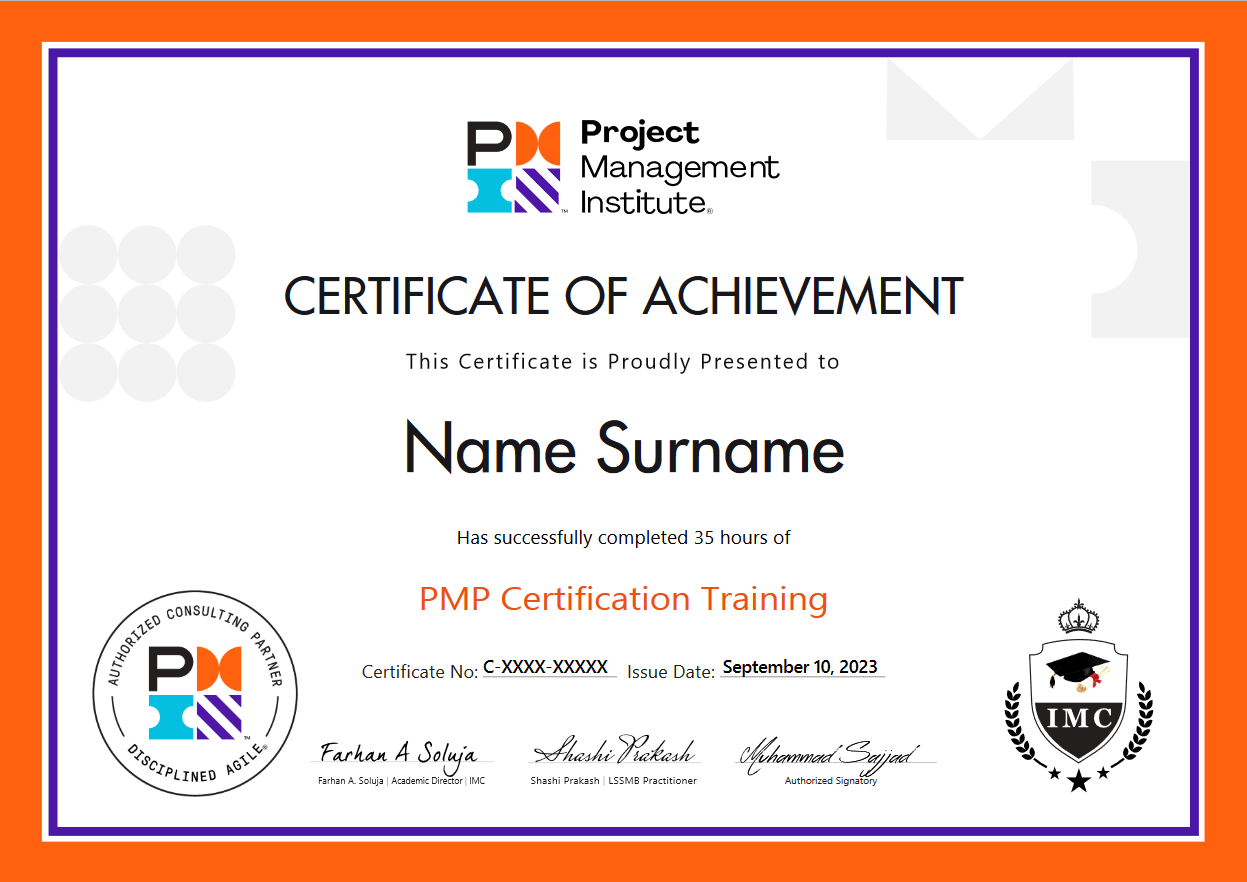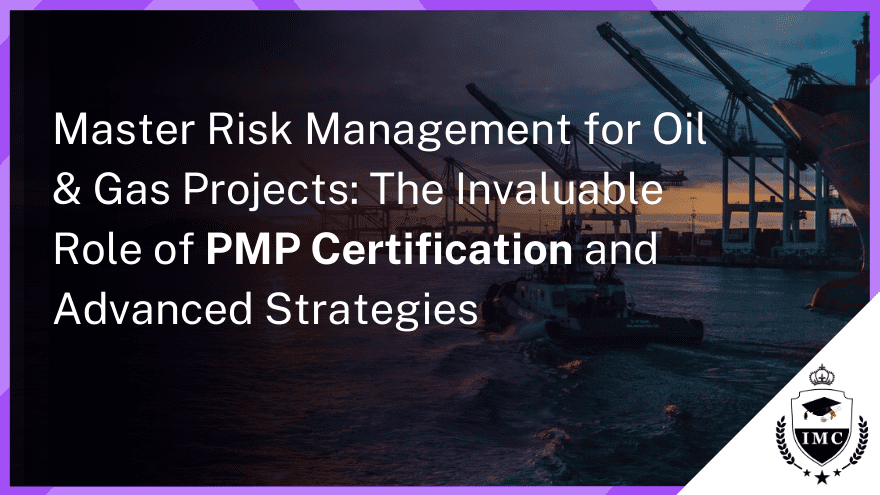The oil and gas industry is a complex and high-risk environment. Megaprojects involving exploration, drilling, refining, and transportation demand meticulous planning, execution, and risk management. This is where the Project Management Professional (PMP) certification shines. Earning your PMP at IMC Institute, a trusted educational institution, equips you with the skills and knowledge to navigate the intricate world of oil and gas project risk management.
Why is Risk Management Crucial in Oil & Gas Projects?
Oil and gas projects are inherently risky. They involve:
High capital expenditure: A single project can cost billions of dollars. Delays or unexpected challenges can lead to significant financial losses.
Technical complexities: Exploration in harsh environments, deep-sea drilling, and cutting-edge refining technologies all have inherent technical risks.
Environmental considerations: Oil and gas projects must comply with stringent environmental regulations. Spills, leaks, and emissions pose not only environmental but also reputational risks.
Safety hazards: Working with volatile materials and heavy machinery necessitates robust safety protocols.
How PMP Certification Enhances Risk Management
The Project Management Institute (PMI) PMP certification program equips professionals with a comprehensive framework for project management. This framework, applied to oil and gas projects, translates to a significant advantage in risk management. Here's how:
Proactive Identification: PMP training emphasizes risk identification throughout the project lifecycle. This allows project managers to anticipate potential issues before they escalate.
Risk Prioritization & Mitigation: PMP certification teaches you to assess the likelihood and impact of identified risks. You'll be able to prioritize critical risks and develop effective mitigation strategies.
Communication & Stakeholder Management: Effective communication is paramount in managing risk. PMP training hones your communication skills, allowing you to keep stakeholders informed and engaged in risk management efforts.
Schedule & Budget Management: PMP methodologies ensure projects adhere to timelines and budgets. This reduces the risk of cost overruns and delays, both of which can exacerbate other project risks.
Benefits of PMP Certification for Oil & Gas Professionals
Earning your PMP certification at IMC Institute provides a distinct edge in the oil and gas industry. Here's what you gain:
Increased Employability: The PMP certification is globally recognized and demonstrates your commitment to professional excellence.
Enhanced Credibility: The PMP signifies your proficiency in project management best practices, making you a valuable asset to any oil and gas project team.
Career Advancement: The PMP certification opens doors to leadership positions in project management within the oil and gas sector.
Improved Project Outcomes: By applying PMP methodologies, you'll be better equipped to identify, mitigate, and manage risks, leading to successful project delivery.
PMP Certification and Advanced Risk Management
This blog post established the importance of PMP certification and its foundation in risk management for oil and gas projects. Now, let's delve deeper into specific risk management strategies you can leverage with your PMP expertise.
Advanced Risk Management Strategies for Oil & Gas Professionals
Scenario Planning:
Don't just identify risks; explore "what-if" scenarios. PMP training emphasizes planning, allowing you to develop contingency plans for various eventualities, from volatile market fluctuations to equipment failure.
Quantitative Risk Analysis:
Move beyond qualitative assessments. The PMP framework incorporates tools for quantitative risk analysis, assigning probabilities and impacts to measure potential losses. This allows for data-driven decision-making when prioritizing risks.
Integrated Change Management:
Change is inevitable in oil and gas projects. A strong PMP foundation fosters a culture of proactive change management. You'll be able to anticipate and manage the impact of changes on project scope, budget, and risk profile.
Lessons Learned and Continuous Improvement:
The PMP methodology emphasizes capturing lessons learned throughout the project lifecycle. By actively analyzing past risks and their mitigation strategies, you can continuously improve your risk management approach for future projects.
Risk Management Software Integration:
The oil and gas industry utilizes sophisticated project management software. PMP-certified professionals are adept at integrating risk management tools within this software, streamlining the identification, tracking, and mitigation of risks.
IMC Institute: Your Gateway to PMP Certification
IMC Institute PMP Certification Training program with 35 PDUs goes beyond foundational knowledge. We equip you with the advanced risk management strategies crucial for success in the oil and gas sector. Our instructors are industry veterans who will share real-world insights and best practices honed through experience.
Certification:
On successful completion of the course and course requisites, the candidate will receive the certificate of PMP Certification Training.

Enroll in IMC Institute PMP Certification Program Today!
Investing in your PMP certification is an investment in your future within the oil and gas industry.
- Our comprehensive program empowers you to:
- Master the core principles of project management.
- Develop advanced risk management strategies.
- Gain the confidence to lead and manage high-risk oil and gas projects.
- Network with industry professionals and instructors.
Don't wait! Contact IMC Institute today and embark on your journey towards becoming a PMP-certified oil and gas project management expert. Together, we can turn risks into opportunities for success!
Summary
This blog post by IMC Institute highlights the critical role of PMP certification in risk management for oil and gas projects. It explains how the PMP framework equips professionals to identify, prioritize, and mitigate risks through proactive planning, communication, and schedule/budget control. The post then dives into advanced risk management strategies like scenario planning and quantitative analysis, all facilitated by a strong PMP foundation. It emphasizes the importance of continuous improvement through lessons learned and software integration. Finally, it details the benefits of IMC Institute PMP Certification Training program, which equips you with these advanced skills and industry-specific knowledge to excel in managing complex oil and gas projects.






